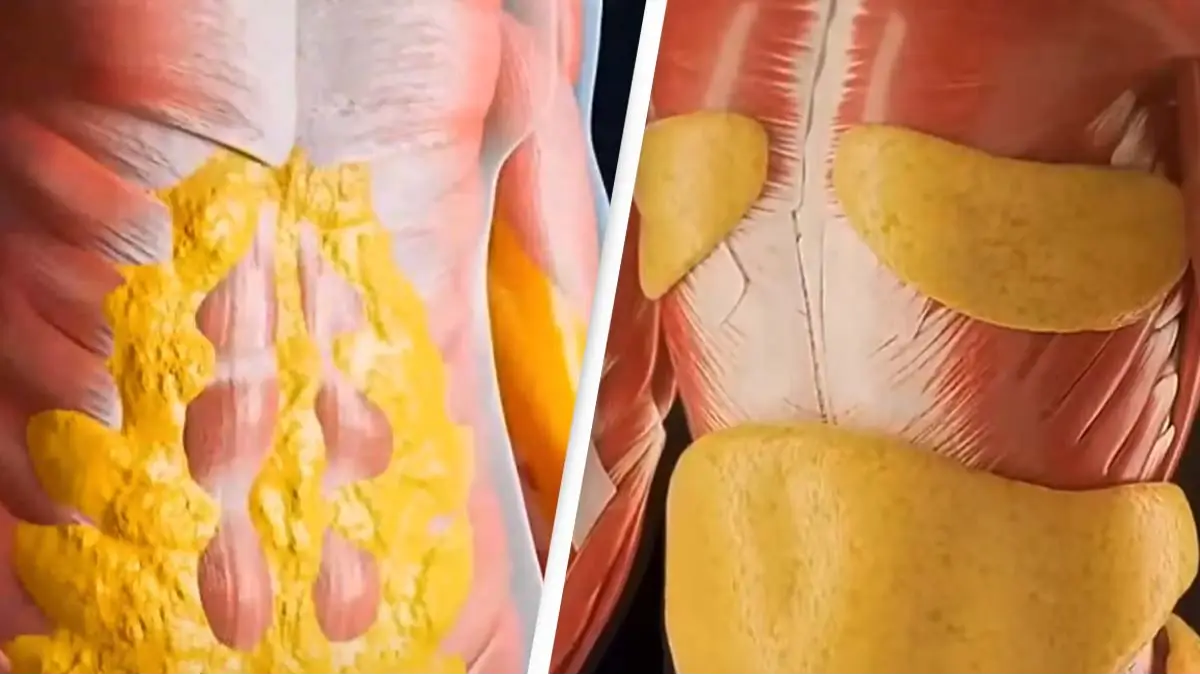
Topics: Food and Drink, Health, Science, YouTube
A mind-boggling simulation showing the impact fasting for a long period has on the body is currently going viral; however, some health experts aren’t quite so convinced.
People fast for a whole load of reasons, including religious observances, to promote weight loss, and even to improve cognitive function.
And while the idea of abstaining from food for a lengthy amount of time may seem abhorrent to some, others swear by the method and regularly incorporate it into their daily and weekly routines.
According to experts at Medical News Today, fasting can also help regulate blood sugar levels and improve insulin sensitivity when completed safely.
Advert
Fasting, however, isn’t for everyone, and it’s recommended that you seek health advice before embarking on one.
However, if you’re curious, a popular YouTube page has detailed exactly what happens to your body during a 36-hour fast—and the results are wild.

In a 55-second video, posted to YouTube by Wellness Wise on May 6, it’s revealed that after four hours of fasting, your body stops digesting food.
According to popular practitioner Doctor Kiltz, this is what is known as the ‘catabolic phase’.
On his website, he says this period is ‘characterized by the breakdown of larger molecules of stored energy into smaller energy molecules which are mobilized to fuel your cells’.
So you haven’t eaten for eight hours?
Well, this is the time when sugar starts to drop in your blood and your body begins to use stored glycogen for energy instead of relying on new fuel coming in, as per the YouTube video.
After 12 hours, your body is depleted of glucose, causing your liver to start breaking down fat into fatty acids called ketones.
This process of turning ketones into food is known as ‘metabolic switching’ and, according to the BBC, is the reason why fasting can lead to weight loss.

A cellular process known as autophagy takes place after 16 hours of going without food.
As per the Cleveland Clinic, this allows a cell to disassemble its junk parts and repurpose the salvageable bits and pieces into new, usable cell parts.
Dr Hiltz explains that exercise and resistance training also helps the autophagy process because if it gets disrupted, it can cause 'problems associated with abnormal cell growth'. Yikes.
A full day without food is a pretty long time for most, but this 24-hour mark is where major cellular repair takes place in the human body.
According to the YouTube video, which has been viewed more than eight million times, your body is fully in fat-burning mode, reducing inflammation and improving insulin sensitivity.
The growth hormone spikes 30 hours after fasting, which reportedly helps to preserve muscle and promote fat loss.
The YouTube video also states that this is the period where ‘deep healing’ begins.
If you fast for 36 hours then you’ve reached the stage of maximum autophagy where your body regenerates tissues and boosts your metabolism.
This full-body reset can be extended to upwards of 72 hours if you want, too.
Experts are divided on whether or not fasting is good for the body, with some claiming a lack of human-backed studies renders making conclusions difficult.
“There [are] a lot of proposed benefits to [running on fats]. But a lot of the research hasn’t really [been borne out in] human beings. So we don’t see dramatic health benefits, certainly in the short term,” James Betts, professor of metabolic physiology at the University of Bath, told The Guardian.
Meanwhile, studies have also found that people who regularly fast more than 16 or 18 hours a day have a higher risk of gallstones, as per News In Health.
Other potential fasting side effects include intense hunger and food cravings, various digestive issues, irritability and low moods. Mark Mattson, a Johns Hopkins neuroscientist, argues that there are a myriad of benefits that come with fasting.
“Many things happen during intermittent fasting that can protect organs against chronic diseases like type 2 diabetes, heart disease, age-related neurodegenerative disorders, even inflammatory bowel disease and many cancers,” he says.
Remember, everyone reacts differently to fasting—so it’s worth checking with your medical professional before taking part in the practice.